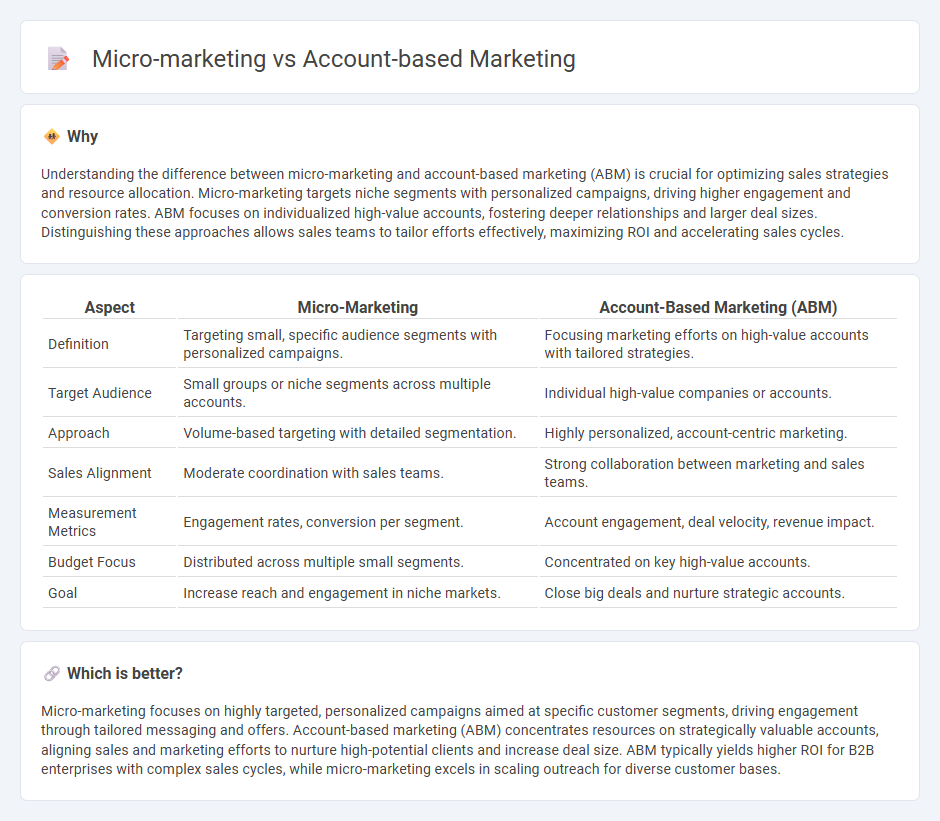
Micro-marketing targets niche customer segments with highly personalized campaigns, maximizing relevance and engagement, while account-based marketing (ABM) focuses on strategic, high-value accounts through tailored, multi-channel outreach. Both approaches optimize sales efforts by aligning marketing resources with specific buyer needs and decision-makers. Discover how these strategies can drive revenue growth by exploring their unique benefits and applications.
Why it is important
Understanding the difference between micro-marketing and account-based marketing (ABM) is crucial for optimizing sales strategies and resource allocation. Micro-marketing targets niche segments with personalized campaigns, driving higher engagement and conversion rates. ABM focuses on individualized high-value accounts, fostering deeper relationships and larger deal sizes. Distinguishing these approaches allows sales teams to tailor efforts effectively, maximizing ROI and accelerating sales cycles.
Comparison Table
| Aspect | Micro-Marketing | Account-Based Marketing (ABM) |
|---|---|---|
| Definition | Targeting small, specific audience segments with personalized campaigns. | Focusing marketing efforts on high-value accounts with tailored strategies. |
| Target Audience | Small groups or niche segments across multiple accounts. | Individual high-value companies or accounts. |
| Approach | Volume-based targeting with detailed segmentation. | Highly personalized, account-centric marketing. |
| Sales Alignment | Moderate coordination with sales teams. | Strong collaboration between marketing and sales teams. |
| Measurement Metrics | Engagement rates, conversion per segment. | Account engagement, deal velocity, revenue impact. |
| Budget Focus | Distributed across multiple small segments. | Concentrated on key high-value accounts. |
| Goal | Increase reach and engagement in niche markets. | Close big deals and nurture strategic accounts. |
Which is better?
Micro-marketing focuses on highly targeted, personalized campaigns aimed at specific customer segments, driving engagement through tailored messaging and offers. Account-based marketing (ABM) concentrates resources on strategically valuable accounts, aligning sales and marketing efforts to nurture high-potential clients and increase deal size. ABM typically yields higher ROI for B2B enterprises with complex sales cycles, while micro-marketing excels in scaling outreach for diverse customer bases.
Connection
Micro-marketing and account-based marketing (ABM) both focus on highly targeted sales strategies that tailor messaging and offers to specific customer segments or individual accounts. Micro-marketing emphasizes customized campaigns at a granular level, often within niche markets or local areas, while ABM concentrates on personalized engagement with key high-value accounts to maximize return on investment. Their connection lies in leveraging detailed customer data and insights to deliver relevant, impactful sales approaches that drive customer acquisition and retention.
Key Terms
**Account-Based Marketing:**
Account-Based Marketing (ABM) targets high-value accounts with personalized campaigns, tailoring strategies to specific business needs and decision-makers to maximize ROI and drive revenue growth. ABM leverages data analytics and account insights to align sales and marketing efforts, enhancing engagement and accelerating sales cycles across chosen accounts. Discover how ABM can transform your B2B marketing strategy and deliver measurable results.
Target Accounts
Account-based marketing (ABM) targets specific high-value accounts with personalized campaigns, optimizing resource allocation for maximum ROI. Micro-marketing narrows the focus further by addressing niche segments or individual prospects with highly tailored messaging often based on detailed buyer personas. Explore the key strategies and tools that differentiate ABM and micro-marketing to maximize engagement with target accounts.
Personalization
Account-based marketing targets high-value accounts with tailored campaigns, leveraging detailed firmographic and behavioral data to maximize ROI. Micro-marketing zeroes in on small, specific customer segments or even individuals, emphasizing hyper-personalization through contextual and real-time data. Discover how these strategies uniquely enhance personalization and drive engagement.
Source and External Links
What is account based marketing? - Account-based marketing (ABM) is a B2B strategy that concentrates resources on personalized marketing for a set of target accounts, fostering sales and marketing alignment to improve customer experiences and streamline winning large accounts.
Your guide to account-based marketing (ABM) - ABM requires collaboration between sales and marketing to map customer journeys, qualify leads smartly, and use specialized ABM platforms to execute highly focused campaigns targeting specific accounts.
Account-Based Marketing (ABM) - ABM treats each high-value customer account as a "market of one," offering tailored content and 1-to-1 experiences to increase pipeline quality, retain top accounts longer, and accelerate revenue growth significantly.
 dowidth.com
dowidth.com